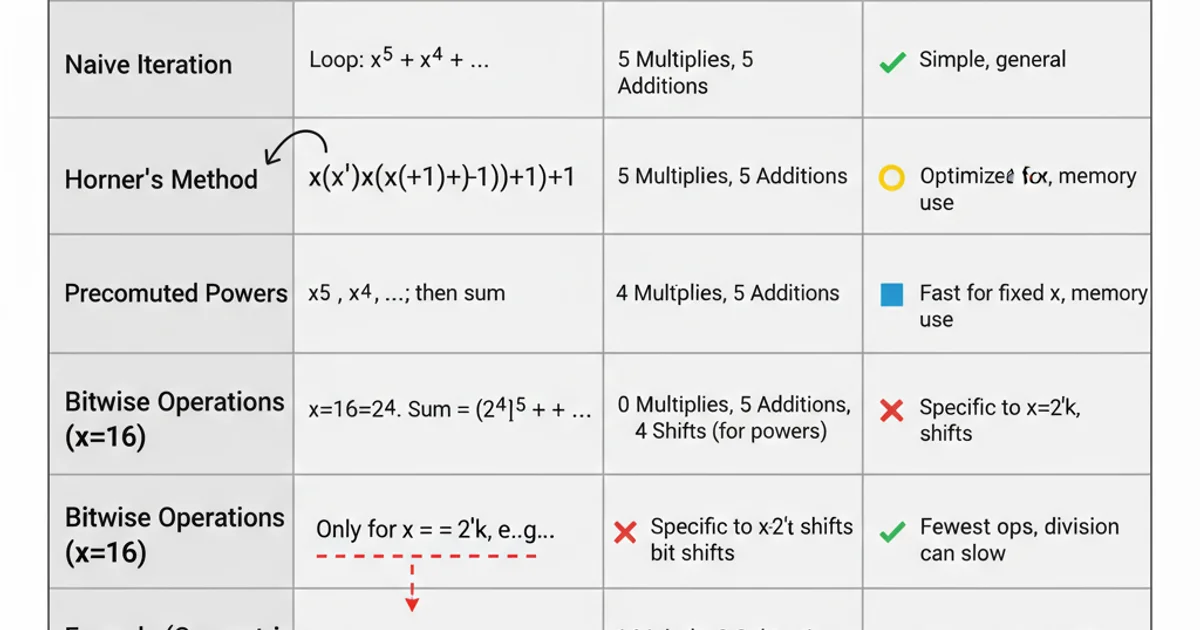Fastest computation of sum x^5 + x^4 + x^3...+x^0 (Bitwise possible ?) with x=16
Categories:
Optimizing Summation: x^5 + x^4 + ... + x^0 for x=16

Explore efficient methods, including bitwise operations and Horner's Rule, to compute polynomial sums, specifically for x=16, and understand their performance implications in C and assembly.
Computing sums of powers, such as (x^5 + x^4 + x^3 + x^2 + x^1 + x^0), is a common task in various computational domains. While a direct approach is straightforward, optimizing this calculation, especially for specific values of (x) like 16, can yield significant performance improvements. This article delves into different strategies, from naive iteration to advanced techniques like Horner's Rule and potential bitwise optimizations, analyzing their efficiency and applicability.
Understanding the Problem: Sum of Powers
The problem asks for the sum (S = \sum_{i=0}^{N} x^i), where (N=5) and (x=16). This is a geometric series. The direct calculation involves computing each power of (x) and then summing them up. For small (N), this might seem trivial, but as (N) grows, the number of multiplications increases. For (x=16), we are dealing with powers of 2, which often hints at potential bitwise optimizations.
flowchart TD
A[Start] --> B{Input x and N};
B --> C[Initialize Sum = 0, Term = 1];
C --> D{Loop i from 0 to N};
D -- Yes --> E[Add Term to Sum];
E --> F[Update Term = Term * x];
F --> D;
D -- No --> G[Return Sum];
G --> H[End];Flowchart for direct summation of powers
Method 1: Direct Iteration
The most straightforward approach is to loop from (i=0) to (N), calculating (x^i) in each step and adding it to a running total. We can optimize the power calculation by multiplying the previous term by (x) instead of re-calculating (x^i) from scratch each time. This reduces the number of multiplications.
#include <stdio.h>
long long sum_powers_direct(int x, int n) {
long long sum = 0;
long long term = 1; // x^0
for (int i = 0; i <= n; ++i) {
sum += term;
term *= x;
}
return sum;
}
int main() {
int x = 16;
int n = 5;
long long result = sum_powers_direct(x, n);
printf("Sum (direct) for x=%d, n=%d: %lld\n", x, n, result);
return 0;
}
C implementation of direct iteration for sum of powers
Method 2: Horner's Rule (Polynomial Evaluation)
Horner's Rule is an efficient algorithm for evaluating polynomials. For a polynomial (P(x) = a_N x^N + a_{N-1} x^{N-1} + \dots + a_1 x + a_0), it can be rewritten as (P(x) = a_0 + x(a_1 + x(a_2 + \dots + x(a_N))\dots)). In our case, all coefficients (a_i = 1). This method minimizes the number of multiplications and additions.
#include <stdio.h>
long long sum_powers_horner(int x, int n) {
long long sum = 1; // Represents the innermost '1' for x^0
for (int i = n; i > 0; --i) {
sum = 1 + x * sum;
}
return sum;
}
int main() {
int x = 16;
int n = 5;
long long result = sum_powers_horner(x, n);
printf("Sum (Horner's) for x=%d, n=%d: %lld\n", x, n, result);
return 0;
}
C implementation of Horner's Rule for sum of powers
Method 3: Bitwise Optimization for x=16
Since (x=16 = 2^4), each power (x^i = (2^4)^i = 2^{4i}). Multiplying by (2^k) is equivalent to a left bit shift by (k) positions. Therefore, (x^i) can be computed as 1LL << (4 * i). This replaces multiplications with potentially faster bit shift operations, especially beneficial in low-level programming or embedded systems.
#include <stdio.h>
long long sum_powers_bitwise(int x, int n) {
if (x != 16) {
// This optimization is specific to x=16 (or powers of 2)
// Fallback to a general method or error handling might be needed
return -1;
}
long long sum = 0;
for (int i = 0; i <= n; ++i) {
sum += (1LL << (4 * i)); // 16^i = (2^4)^i = 2^(4*i)
}
return sum;
}
int main() {
int x = 16;
int n = 5;
long long result = sum_powers_bitwise(x, n);
printf("Sum (bitwise) for x=%d, n=%d: %lld\n", x, n, result);
return 0;
}
C implementation using bitwise shifts for x=16
Method 4: Closed-Form Geometric Series Formula
The sum of a geometric series (S = \sum_{i=0}^{N} r^i) has a closed-form solution: (S = \frac{r^{N+1} - 1}{r - 1}). For (x=16) and (N=5), this becomes (S = \frac{16^{5+1} - 1}{16 - 1} = \frac{16^6 - 1}{15}). This method involves a single power calculation, a subtraction, and a division. While mathematically elegant, division can sometimes be slower than a series of multiplications and additions on a CPU.
#include <stdio.h>
#include <math.h>
long long sum_powers_formula(int x, int n) {
if (x == 1) return n + 1; // Special case for r=1
long long numerator = 1LL; // Start with 1LL to ensure long long type
for (int i = 0; i < n + 1; ++i) {
numerator *= x;
}
numerator -= 1;
long long denominator = x - 1;
return numerator / denominator;
}
int main() {
int x = 16;
int n = 5;
long long result = sum_powers_formula(x, n);
printf("Sum (formula) for x=%d, n=%d: %lld\n", x, n, result);
return 0;
}
C implementation using the closed-form geometric series formula
Performance Comparison and Assembly Considerations
For (x=16) and (N=5), the values are small enough that all methods will execute extremely quickly. However, understanding their underlying operations helps in scenarios with larger (N) or different (x).
- Direct Iteration: Involves (N) multiplications and (N+1) additions. For (x=16),
term *= xmight be optimized by the compiler into a left shift (shl) ifxis a constant power of 2. - Horner's Rule: Involves (N) multiplications and (N) additions. This is generally the most efficient for arbitrary (x).
- Bitwise Optimization: For (x=16), this involves (N+1) left shifts and (N) additions. Bit shifts are typically very fast, often single-cycle operations on modern CPUs.
- Closed-Form Formula: Involves one power calculation (which itself can be optimized, e.g., by exponentiation by squaring), one subtraction, and one division. Division is often the slowest arithmetic operation on a CPU.
For (x=16), the bitwise approach is likely to be the fastest at the assembly level, as shl instructions are highly optimized. Horner's rule is a strong contender for general cases. Compilers are often smart enough to optimize constant multiplications into shifts, so the performance difference between Horner's and bitwise for (x=16) might be negligible in optimized C code.

Comparison of different methods for sum of powers